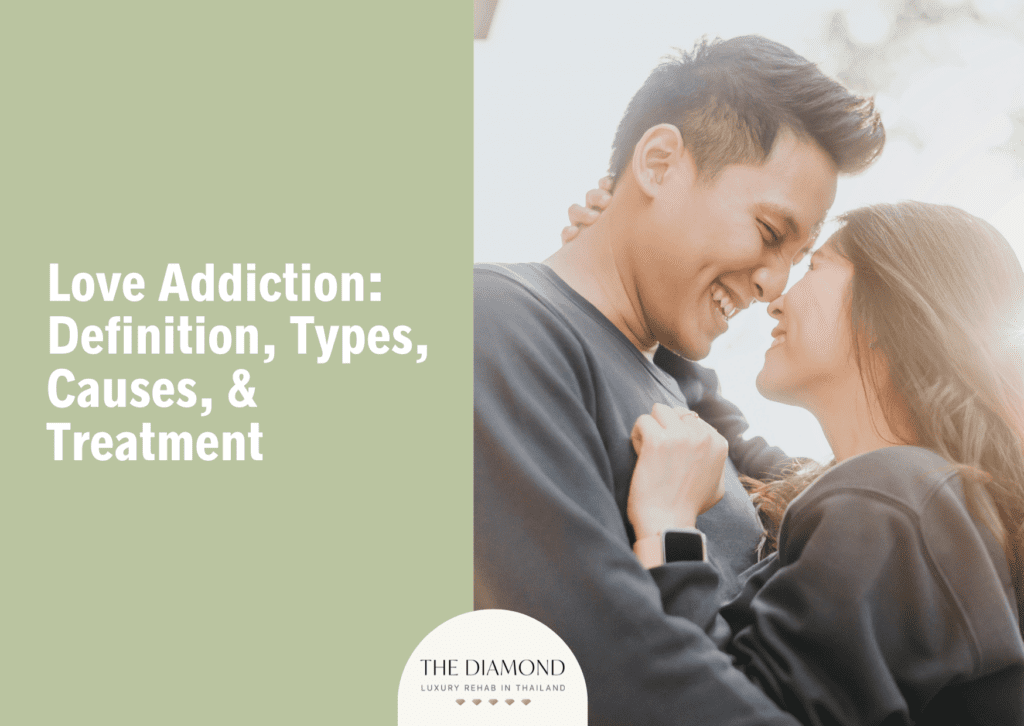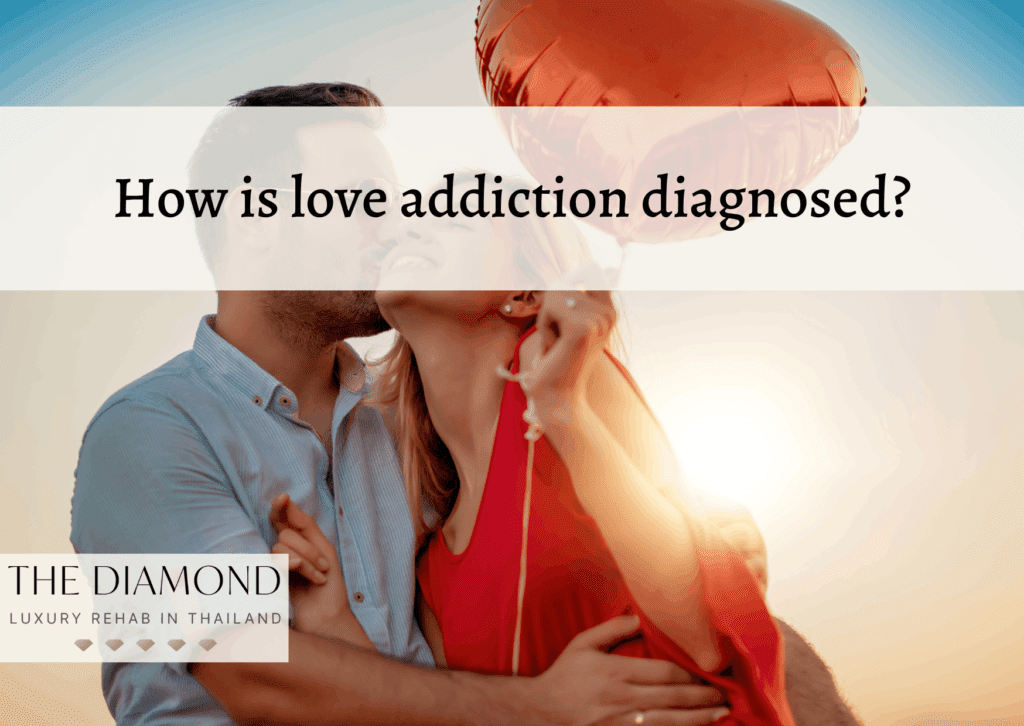Love addiction: definition, types, causes, and treatment
Table of content
- What is love addiction?
- What is another term for love addiction?
- What are the types of love addiction?
- What are the causes of love addiction?
- What are the symptoms of love addiction?

Love addiction is a pattern of behaviors that leads to an individual developing an intense fixation on their romantic partner or on the sense of falling in love. This obsession with love consumes every aspect of a love addict’s life, prioritizing their romantic endeavors above all other relationships, hobbies, or activities.
The symptoms of love addiction include feeling an overwhelming need to be in love or to love someone, obsessing over a romantic partner to a severe degree, and feeling completely dependent on a romantic partner.
There are four types of love addiction, namely: obsessed/obsessive love addiction, ambivalent love addiction, codependent love addiction, and narcissistic love addiction.
Love addiction can be caused by childhood experiences, low self-esteem, unmet emotional needs, biological factors, insecurity and fear of abandonment, unresolved trauma, co-occurring mental health conditions, and social and cultural influences.
A treatment plan for love addiction could include therapy, such as cognitive behavioral therapy, treating co-occurring mental health conditions, and adopting positive lifestyle changes. Risk factors for love addiction include childhood environmental factors, abuse or trauma from past relationships, and low self-esteem issues.
What is love addiction?
Love addiction refers to a pattern of behaviors characterized by an intense fixation on the sensation of being in love, prompting individuals to actively pursue love in a manner that can result in unwanted consequences.
Love addiction can be classified as a behavioral addiction, according to a 2019 article titled “What Is Love Addiction?” published by Psychology Today. Behavioral addictions do not require the consumption of psychoactive substances.
What is another term for love addiction?
Love addiction is also known as pathological love. However, it’s more commonly referred to as love addiction. There is a debate among professionals about whether the term “addiction” should be used to describe this pattern of behaviors.
In an article titled “Unpacking the Notion of Love Addiction,” published by Healthline in 2022, Emily Simonian highlights that love addiction is not as life-threatening as substance addiction. Furthermore, she argues that the widespread use of the term “addiction” may diminish its true significance for the general public.
How common is love addiction?
The occurrence of love addiction is estimated to be between 3% and 10% of the population. However, it is likely to be higher in specific populations, such as college students, where it may reach up to 25%, according to Arash Emamzadeh in his 2019 article published on Psychology Today.
What are the types of love addiction?

There are four types of love addiction:
- Obsessed/obsessive love addiction
- Ambivalent love addiction
- Codependent love addiction
- Narcissistic love addiction
1. Obsessed/obsessive love addiction
Obsessive love addiction occurs when an individual becomes fixated on someone and engages in obsessive-compulsive behaviors, such as persistent phone calls, text messages, or even stalking. Obsessive love addicts usually struggle to detach from a romantic partner, no matter if the relationship has become unhealthy, according to Addiction Center.
2. Ambivalent love addiction
Ambivalent love addicts have a strong craving for love, yet they shy away from true intimacy. They tend to deliberately sabotage relationships once they become too intimate, according to Daisy Simon in her article titled “Is Love Addiction Real? 4 Types of Love Addicts” published by the Minds Journal. Ambivalent love addiction can also manifest in individuals who engage in one-sided relationships or desperately hold on to past relationships.
3. Codependent love addiction
Codependent love addicts tend to look at their partners as a source of validation and to improve their own self-worth. A codependent love addict will put the needs and interests of their partner above their own, depending on their partners’ satisfaction to feel fulfilled. Codependent love addicts usually have a low self-image due to unresolved childhood trauma or being abandoned in a previous relationship (romantic or familial).
4. Narcissistic love addiction
Narcissistic love addicts want to feel in control of their relationship. They manifest this by dominating their partner and controlling what they get out of a relationship. Additionally, they can severely mistreat their partner by ignoring them and acting out in selfishness. This type of love addiction could potentially be dangerous as a narcissistic love addict may resort to violence if their partner attempts to end the relationship.
What are the causes of love addiction?
The causes of love addiction are listed below:
- Childhood experiences
- Low self-esteem
- Unmet emotional needs
- Biological factors
- Insecurity and fear of abandonment
- Unresolved trauma
- Co-occurring mental health conditions
- Social and cultural influences
1. Childhood experiences
Childhood experiences encompass both positive and negative experiences with family, peers, and the community during one’s early years. According to Claire Rutkowski’s 2018 article published by the National Institutes of Health, adolescents who grow up in positive family relationships are more likely to have healthy romantic relationships in their young adult life.
On the other hand, childhood trauma, albeit emotional, physical, sexual, or verbal abuse/neglect, plays a significant role in the development of unhealthy relationships with others later in life, according to Yumbul et al. in their 2010 article published in the Procedia Social and Behavioral Sciences.
Children learn about emotional bonds from family and peers early in life, and they actively seek out similar bonds later in life. Thus if one experiences any abuse or unmet emotional needs, it will have an impact on how they act in future romantic relationships.
2. Low self-esteem
Low self-esteem refers to seeing oneself in a very critical and negative light. People who have low self-esteem tend to judge themselves on any imperfection and completely ignore positive qualities of themselves.
According to Gori et al., in their 2023 article published in the Journal of Personalized Medicine, studies have shown that love addicts tend to have lower self-esteem than others in healthy romantic relationships.
A low-self esteem may heighten feelings of insecurity in a relationship. This could manifest as obsessive or codependent love addiction, where the individual becomes overly fixated on their relationship because they perceive themselves as having low self-worth and tie their self-esteem to their romantic connections.
3. Unmet emotional needs
How an individual’s emotional needs are met during childhood or early adult life could influence the development of behavioral addictions, such as love addiction. Unmet emotional needs could refer to no boundaries being set, low self-esteem, emotional vulnerability, etc.
Unmet emotional needs in previous romantic relationships could affect how an individual acts with a new romantic partner. In the same way, parents should also meet the emotional needs, such as safety, independence, and boundaries, of their children during childhood and adolescence.
When emotional needs are not met, whether due to abuse or neglect, it impacts how the individual acts in future romantic relationships. For example, if parents set no boundaries during childhood, the individual will struggle with boundaries during adult relationships.
4. Biological factors
Biological factors refer to genes and family history. If a family has a long history of love addiction or pathological love, the chances are higher that the individual will also experience love addiction.
According to a 2022 article published on Cleveland Clinic, titled “Is Addiction Hereditary?”, high levels of dopamine can fuel impulse control and make an individual more prone to addiction.
If someone has a familial background with a history of mental health conditions occurring simultaneously, particularly substance use disorder, they may be at a higher risk of developing love addiction.
5. Insecurity and fear of abandonment
Insecurity and the fear of abandonment are both types of anxieties that can lead to a person constantly needing reassurance that their partner will not leave them. These individuals harbor irrational fears that their partner may desert them and end the relationship.
Consequently, they may display excessive jealousy, anticipate the worst, or become overly clingy, constantly inquiring about their partner’s whereabouts and activities. Individuals who have been abandoned by a parent or a previous romantic partner might develop a belief that they are unlovable or undeserving of love, as mentioned in a 2023 article titled “5 Reasons Behind Love Addiction,” published on BetterHelp.
Insecurity and fear of abandonment can stem from childhood loss. An individual who has anxiety about abandonment will often have trouble trusting in a relationship or become extremely jealous or controlling.
6. Unresolved trauma
Trauma is the emotional response after a deeply distressing event, such as rape, violence, accidents, natural disasters, or sensory overload. When this emotional response goes unresolved, it can lead to challenges in future relationships, such as harboring expectations of danger or betrayal.
For example, an individual had a past partner who was physically abusive whenever they drank alcohol. If that person hasn’t addressed their trauma, they would react strongly and start arguing whenever their current partner tries to grab a beer. This situation would trigger them and make them relive the abuse from their previous relationship.
If trauma remains unresolved, there will be frequent triggers that cause an emotional response. These triggers can arise from unintentional behaviors exhibited by one’s partner that serve as cues or reminders of the initial trauma, according to Robert Johnson in his 2020 article titled “The Impact of Unresolved Trauma on Relationships.”
Unresolved trauma can lead to love addiction as a coping mechanism to fill emotional voids and seek validation, according to a 2021 article titled “What is Love Addiction?” and published by Integrative Life Center. Individuals may become dependent on romantic relationships to escape or numb painful memories and feelings associated with their trauma.
7. Co-occurring mental health conditions
Mental health conditions refer to conditions that affect how a person feels, thinks or behaves. A mental illness typically has an impact on an individual’s daily functioning and quality of life. Co-occurring mental health conditions develop alongside love addiction. These conditions could include anxiety, depression, or substance use disorder, and they typically worsen the symptoms of love addiction.
If a love addict yearns for the dopamine high of being in love, they might start to search for that high in other substances as well, such as alcohol or drugs. Moreover, if a love addict does not receive the affection they crave from a romantic relationship, they could fall into depression or have severe anxiety, according to Addiction Center.
These co-occurring mental health conditions can also stem from unresolved trauma or childhood trauma. If an individual has a family history of substance use disorder, they are more prone to also develop this mental health condition and thus they are more prone to develop love addiction.
8. Social and cultural influences
Society and cultural factors refer to one’s beliefs and values instilled by the society and culture in which they were raised. These beliefs could refer to religion, values, sexuality, and attitudes.
In Western society, falling in love is regarded as a positive experience, and people often yearn for the feeling of falling in love. However, it might be frowned upon to refer to love addiction as a negative subject in Western society, according to Earp et al. in their 2017 article published in the Philosophy, Psychiatry, & Psychology journal.
This overwhelmingly positive outlook on love and the experience of falling in love may contribute to the manifestation of symptoms associated with love addiction. It can also pose challenges for individuals struggling with love addiction to seek professional assistance and feel truly understood in their emotions.
What are the medical conditions that cause love addiction?

The medical conditions that can cause love addiction are co-occurring mental health conditions listed below:
- Depression: People who are depressed might seek out the feeling of falling in love to experience a dopamine surge. They might also break up and immediately enter a new relationship once that dopamine surge starts to wear off. They seek the feeling of happiness in the act of falling in love.
- Anxiety: Anxiety could manifest as codependent or obsessive love addiction as the individual reflects their feelings of anxiety onto a romantic relationship. They might feel like their partner will break up with them at any moment, or they’ll have anxiety about their partner’s loyalty.
- Substance Use Disorder (SUD): The brain releases the same chemical (dopamine) when actively using drugs and when falling in love. A person who is abusing drugs might search for that dopamine surge in other areas of their life and could develop love addiction as a consequence.
Can love addiction be considered a mental health disorder?
Love addiction should not be considered a mental health disorder since it is not recognized by the Diagnostic and Statistical Manual of Mental Health (DSM). It is not an official diagnosis that a medical professional would give their patients.
What are the symptoms of love addiction?
The symptoms of love addiction include these behavioral patterns:
- Feeling an overwhelming need to be in love or to love someone.
- Obsessing over a romantic partner to a severe degree.
- Feeling completely dependent on a romantic partner.
- Feeling despondent when not in a romantic relationship.
- Prioritizing a romantic relationship over any other relationship in one’s life.
Love addiction symptoms differ per person as it does not have an official set of symptoms or diagnostic criteria.
When do love addiction symptoms usually occur?
Love addiction symptoms can manifest at different stages. Some individuals may only experience these symptoms when they enter a new relationship following an abusive one. On the other hand, for some, these symptoms might have emerged during adolescence as a result of childhood experiences and have become so ingrained in their lives that they find it difficult to recognize their own love addiction symptoms.
What are the risk factors of love addiction?
The risk factors of love addiction are:
- Childhood environmental factors: During childhood, a person’s understanding of relationships and love is shaped by their relationship with others in the community and their family/parents. If these relationships are unhealthy, it can lead to the tendency to search out unhealthy relationships in adulthood.
- Abuse or trauma from past relationships: How an individual is treated in a past romantic relationship could impact their choice of partner in a future romantic relationship.
- Low self-esteem issues: People with low self-esteem issues may seek constant validation from others in their lives, including their romantic partners. This need for validation can cause love addiction to develop.
How is love addiction diagnosed?

There is no clinical diagnosis of love addiction, according to the Diagnostic and Statistical Manual of Mental Disorders (DSM-5). If an individual experiences the signs of love addiction, needing to be in love, feeling unable to be alone, and obsessing over romantic interests, they can discuss these signs with a psychotherapist, according to a 2022 article titled “What Does Love Addiction Look Like?”, published by Steps to Recovery. A psychotherapist can conduct a variety of tests to rule out other mental health conditions and provide a plan to manage the love addiction symptoms.
Where can you seek a love addiction diagnosis?
Love addiction cannot be officially diagnosed by a healthcare provider since it is not recognized in the DSM-5. However, if an individual shows symptoms of love addiction, they can schedule a session with a therapist and discuss options to manage their emotions.
What are the treatments available for love addiction?
The treatments available for love addiction include therapy, lifestyle changes, and treating co-occurring mental health conditions.
Psychosocial interventions, such as cognitive behavioral therapy, are treatment plans that could be considered for love addicts, according to Sanches and John in their 2019 article published in the European Journal of Psychiatry. Therapy could help to identify the root cause of the love addiction.
If the individual has co-occurring mental health disorders, a medical professional might treat those disorders. For example, a love addict who also has depression might be prescribed antidepressants, which could also lessen the symptoms of their love addiction.
Treatment for love addicts works best when combined with positive lifestyle changes. This includes recognizing the differences between a healthy and unhealthy romantic relationship, developing healthier coping strategies, and addressing any unresolved trauma.
Love addiction is not recognized by the DSM-5 and thus does not have a recognized treatment plan, although a doctor or therapist can prescribe a treatment plan at their own discretion. There are benefits to working with a therapist and creating a personalized treatment plan. Without treatment, living with love addiction can be challenging and may result in difficulties when forming and maintaining romantic relationships.
When should we seek treatment for love addiction?
When the symptoms and signs of love addiction start to affect an individual’s romantic relationships or start to affect any major part of one’s life, it would be best to discuss the symptoms with a doctor or therapist.
How is love addiction prevented?
Preventing love addiction involves prioritizing one’s mental well-being. Cultivating self-love is an effective preventive tool as it reduces the need for validation from a partner. Another effective measure is developing self-awareness of one’s tendencies in romantic relationships. By understanding the risk factors and underlying causes of love addiction, individuals can learn to manage and address their emotions without burdening their romantic partners.

